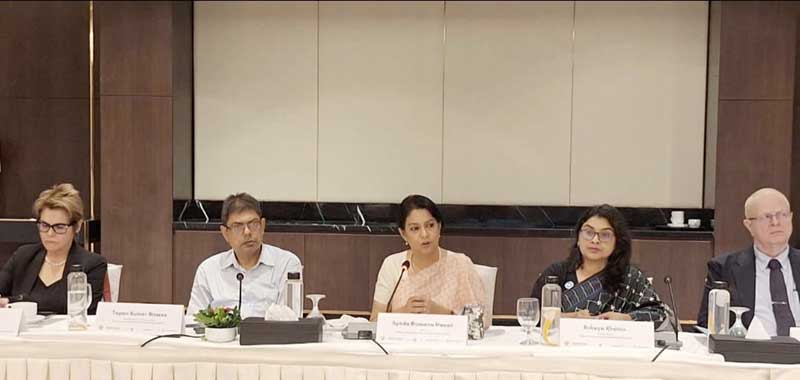October 08, 2024

South Asia Cooperative Environment Program (SACEP) and the Ministry of Environment, Forest and Climate Change, Bangladesh jointly organized a High-Level Round Table Discussion to discuss Plastic Waste free Management Challenges and Solutions in Bangladesh. The Round Table Discussion was organized on 30th September 2024, a day prior to Bangladesh’s announcement of imposing a ban on polyethylene shopping bags starting with Supermarket chains from the 1st of October 2024. The event was organized under PLEASE Project funded by World Bank and supported by UNOPS.
H.E. Ms Syeda Rizwana Hasan, Hon'ble Advisor to the Ministry of Environment, Forest, and Climate Change (MoEFCC), and the Ministry of Water Resource has inaugurated the event as chief guest.
"Plastic Pollution is a tough fight but a fight worth fighting” said the distinguished chief guest. Speaking further, Ms. Hasan reminded Bangladesh’s bold action calling a ban on plastic bag ban back in 2002, being the first country in the World for other countries to follow suit, and expanding such prohibition to other single-use plastic (SUP) products eventually and making Saint martin’s Island, Kuakata beach, and the Sundarbans free from SUP - Bangladesh’s pioneering and persistence actions against SUPs. She also highlighted the need to target the whole plastic value chain and more so targeting consumerism, by providing awareness creation, providing access to safe and affordable alternatives to single-use plastics, as well as to address the toxic and hazardous chemicals in the plastics.
Ms. Rokeya Khaton, Director General, SACEP, thanked the MoEFCC for co-organizing the Round Table Discussion. She explained the aspiration of the PLEASE to make rivers and seas of South Asia plastic-free through designing and implementing innovative solutions, inviting multi-sector participation and a platform for regional collaboration and cooperation to fight the plastic pollution, one of the most challenging environmental crises of recent times. She invited the Round Table participants to continue the conversation as well as walk the talk by making transformative actions at their own-levels and capacities. Other notable speakers Gayle Martin, Operations Manager of the World Bank Bangladesh, Sudhir Muralidharan, Country Manager of UNOPS Bangladesh, H.E. Marie Masdupuy, Ambassador of France to Bangladesh, also highlighted the danger of plastic pollution and the urgency to address it nationally and through regional collaboration.
Various existing and planned policy solutions and enforcement status and challenges were also discussed during the first thematic discussion session on policy and regulatory matters related to plastic waste management. It was mentioned that Bangladesh has almost 21 policies that have some aspects related to general solid waste and plastic waste. Similarly, it was informed that the country is in process of implementing the Extended Producer Responsibility (EPR) soon as currently it is with the Ministry of Law for review. Other policies and regulatory frameworks discussed included, the National Action Plan for Sustainable Plastic Management (2022-2030), Plastic Industry Development Policy 2023, and Bangladesh’s clear position and negotiation at the Intergovernmental Negotiation Committee (INC) for global plastic treaty advocating differentiated impacts of plastic pollution to low-riparian countries like Bangladesh, and suffers transboundary plastic pollution, hence seeking suitable financing mechanisms in the Global Plastic Treaty. Speaking of challenges, participants highlighted the lack of effective enforcement of policies and regulations, and lack of active participation and assessment of capacities of local government who are the actual implementers of the policies and regulations. A need of policy or guideline on recycling standardization and certification with strict government monitoring of recycling processes and products was identified to make recycling safe.
Bi and multilateral development partners’ funding and synergies among projects addressing plastic pollution in Bangladesh were also discussed at the Round Table by the representatives including diplomatic missions - the Embassy of Sweden, the Embassy of Norway, the Embassy of the Netherlands, and development partners, World Bank and UNIDO. Followed by was the sharing of PLEASE Project Grantees – BRAC, BPCL, Red Orange, Aranyak Foundation, and Institute of Marine Science, Chattogram University – work on addressing plastic pollution in Bangladesh. Additionally, Eco-Social Development Organization (ESDO), Waste Concern, and Unilever shared their experiences around plastic waste management.



